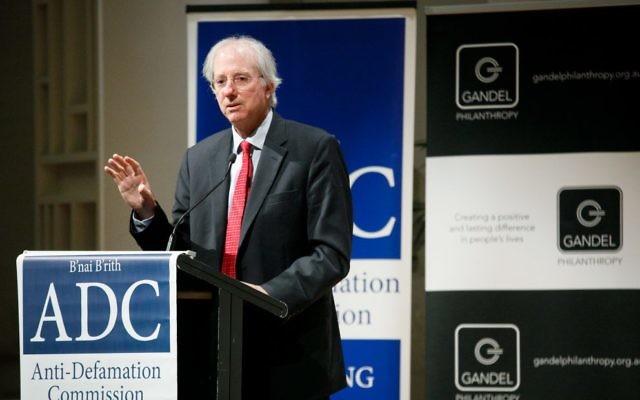A chat with Ross
Former US chief Middle East negotiator Dennis Ross was US president Bill Clinton's Middle East envoy and helped shepherd the 1995 Interim Agreement and the 1997 Hebron Accord.
FORMER US chief Middle East negotiator Dennis Ross has warned if Australia were to prematurely recognise a Palestinian state, it would send the wrong message.
Ross was US president Bill Clinton’s Middle East envoy and helped shepherd the 1995 Interim Agreement and the 1997 Hebron Accord. He was also involved in the 1995 Israel–Jordan peace treaty negotiations and the failed July 2000 Camp David talks.
He spoke with Zionist Federation of Australia director of public affairs Bren Carlill last Friday.
Addressing the Oslo Accords, he said the agreements were based on an assumption.
“The logic was, you couldn’t take on the narrative issues like Jerusalem or the refugees because it was too hard,” he said. “As each side learned to live together … then you could take on these issues.”
But he said more examples that living together and cooperating paid off were needed.
“We needed to build the credibility of peace making, so that we could insulate it from those who were trying to subvert it,” he said.
“When I look back, I think we needed to do more with both sides to condition them on the kind of steps that were necessary.”
Ross was asked whether the current generation of Israeli leaders have the same ability to make bold decisions as the heroic founders of Israel, to which he said yes.
Regarding premature recognition of a Palestinian state, he said, “To take that step when there is no behaviour coming from the Palestinians that justifies it is a way of saying, ‘You don’t have to be responsible and you still get things.'”
Ross also warned that current US policy on Iran appears to be drifting from nuclear prevention to a policy of containment – an implicit acceptance of Iranian nuclear weapons capability.
He said the US needs to show it is serious about preventing a nuclear Iran.
“There are things that can be done that would change the Iranian calculus,” he said.
“The problem is, you have to make yourself credible and be willing to use the force to convince them that they’re on a path that is too risky, as they define risk.”


comments